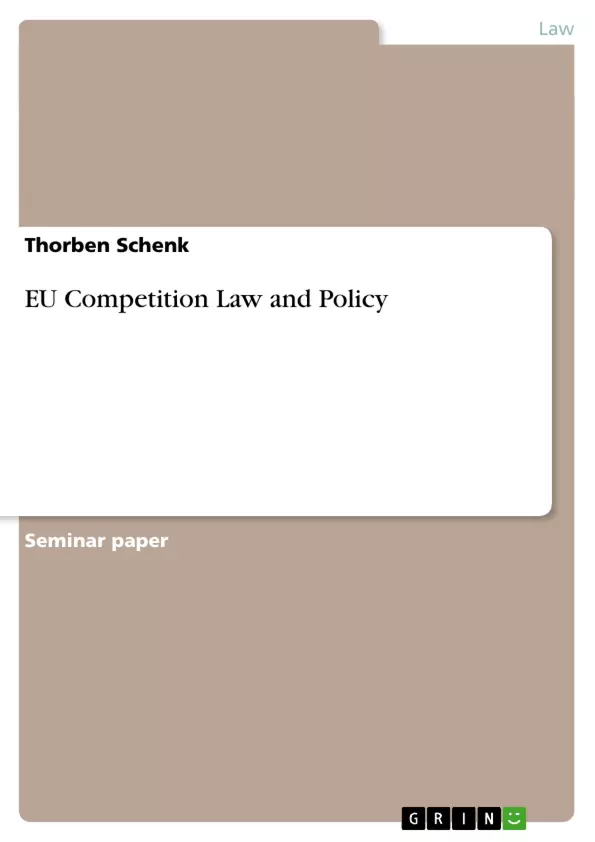Competition between companies, governments and states within and across the global trading areas1 has become a vital part in this new world of less political and economical boundaries. Competition law therefore has to regulate the market powers of those who participate in the global exchange of goods and services. “There are now at least 80 systems of competition law in the world, in all continents and in all types of economies; many others are in contemplation.[...]”2. It has a substantial impact upon the outline of agreements.
With Articles 81 and 82 of the EEC Treaty EU jurisprudence and the legislative bodies of the Member States (MMS) have a basis to work on this topic of immense importance. Ignoring the competition rules not seldom lead to large fines being levied by the European Commission (in July 1991 Tetra Pak was fined because of competition law infringement with a record sum of ₤52mn)3. The aim of this essay is to briefly outline the scope of EU´s competition policy and laws and to give an insight into both the Agreements of Minor Importance (“de Minimis”) and the impact of Competition Law on the topic of parallel (grey) imports. The latter is examined on a case study given.
The basis of this essay consists of secondary literature taken from books, treaties, articles, notices or webpages. A full bibliography can be found at the end of the main part.
Inhaltsverzeichnis (Table of Contents)
- Introduction
- Competition Law - A Brief Outline
- The Treaty Articles 81 (85) and 82 (86)
- Agreements of Minor Importance - The de Minimis principle
- The "New Notice" C 368/13
- The Impact on the Effectiveness of Competition Policy Intervention
- Weltbummel AG and Bouncing Balls Ltd
- The Case - Their Action
- The Legal Assessment
- The Outcome - Worst Case Scenario
- Conclusion
Zielsetzung und Themenschwerpunkte (Objectives and Key Themes)
This essay aims to provide a concise overview of EU competition policy and law, focusing on the Agreements of Minor Importance ("de Minimis") and the impact of Competition Law on parallel (grey) imports. The essay uses a case study to illustrate the application of these principles.
- The scope of EU competition policy and law
- The application of the "de Minimis" principle to agreements of minor importance
- The impact of competition law on parallel (grey) imports
- The analysis of a specific case study to demonstrate these principles
- The role of the European Commission in enforcing competition law
Zusammenfassung der Kapitel (Chapter Summaries)
- Introduction: Introduces the importance of competition law in the globalized economy and outlines the essay's scope and focus, particularly on Agreements of Minor Importance and parallel imports.
- Competition Law - A Brief Outline: Provides a general overview of EU competition law, including a discussion of Articles 81 and 82 of the EC Treaty, which form the legal basis for regulating competition within the EU.
- Agreements of Minor Importance - The 'de Minimis Principle: Explains the concept of agreements of minor importance that fall outside the scope of Article 81 because their impact on competition or inter-state trade is insignificant. It discusses the Commission's notices on the de minimis principle, including the "New Notice" C 368/13.
- Weltbummel AG and Bouncing Balls Ltd: Presents a case study involving two companies, examining their actions, the legal assessment of the situation, and the potential consequences, focusing on the application of competition law.
Schlüsselwörter (Keywords)
The primary focus of this essay is on EU competition law, particularly the concept of "de minimis" agreements, parallel (grey) imports, and the application of Articles 81 and 82 of the EC Treaty. It also examines the role of the European Commission in enforcing competition law and the potential consequences of violating these regulations.
Frequently Asked Questions
What are Articles 81 and 82 of the EC Treaty?
These articles form the basis of EU competition law, regulating anti-competitive agreements (Art 81) and the abuse of a dominant market position (Art 82).
What is the "de Minimis" principle in competition law?
It refers to agreements of minor importance that do not significantly affect competition or inter-state trade and are therefore not prohibited under Article 81.
How does EU law treat "parallel imports"?
Parallel (or grey) imports involve the trade of branded goods across borders without the owner's consent. EU law generally protects them to ensure a single market and price competition.
What is the role of the European Commission in this field?
The Commission enforces competition rules and can levy significant fines (e.g., the Tetra Pak case) on companies that infringe upon these regulations.
What does the case study of "Weltbummel AG" illustrate?
It demonstrates the legal assessment of business actions regarding competition law and the potential "worst-case scenario" for companies violating EU rules.
What is the "New Notice" C 368/13?
It is a specific Commission notice that clarifies the thresholds and conditions under which agreements are considered of minor importance (de minimis).
- Citar trabajo
- Thorben Schenk (Autor), 2004, EU Competition Law and Policy, Múnich, GRIN Verlag, https://www.grin.com/document/28469



